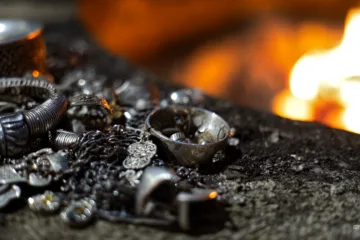The process of resizing gold and silver rings, highlighting the technical nuances, material considerations, and the varying costs associated with this common yet complex jewelry modification.
Resizing rings is a common request in the world of jewelry, especially for gold and silver pieces, due to their malleability and durability. This is the process of resizing these precious metal rings, shedding light on the technical and aesthetic considerations that jewelers take into account during the resizing process.
Understanding the Need for Resizing
Ring resizing might be necessary for a variety of reasons, such as changes in finger size due to weight fluctuations, climate changes, or simply because the ring was purchased or gifted in the wrong size. Whatever the reason, resizing is a delicate process that requires expertise, precision, and a deep understanding of the material properties of gold and silver.
The Resizing Process Explained
Initial Assessment
The first step in resizing a ring is the initial assessment. A jeweler examines the ring to determine its current size, the desired size, and assesses any gemstones or intricate designs that might affect the resizing process. This step is crucial for planning the approach, as the presence of gemstones or specific patterns can complicate the resizing process.
Sizing Down
To size a ring down, the jeweler removes a small section of the band. After cutting out the piece, the two ends are brought together and soldered to close the gap. The ring is then carefully cleaned and polished to remove any signs of work, ensuring that the band appears seamless. This process requires meticulous attention to detail to ensure that the ring maintains its original shape and integrity.
Sizing Up
Sizing a ring up involves a more complex procedure. The jeweler cuts the band at a specific point and then adds a new piece of metal to enlarge the ring to the desired size. This added piece must match the original ring’s metal in terms of color, karat (for gold), and composition. After soldering the new piece in place, the jeweler will finish the ring by cleaning, polishing, and reapplying any necessary textures or finishes to match the original design.
Considerations for Gold and Silver Rings
-
- Material Properties: Gold and silver have different hardness and malleability, which affect how they are handled during the resizing process. For instance, gold comes in various karats, with higher karats being softer and more malleable, thus requiring gentler handling. Silver, while also malleable, tends to tarnish and may require additional finishing steps to restore its original luster.
- Gemstones and Settings: Rings with gemstones, particularly those with settings close to the band’s resizing point, need extra care. Heat from soldering can damage some gemstones, so a jeweler might use protective measures or temporarily remove the stones during resizing.
- Aesthetic Integrity: Preserving the ring’s design and ensuring that any added material blends seamlessly with the original band is paramount. This is especially important for rings with intricate patterns, engravings, or specific finishes that need to be matched perfectly.
The Cost of Ring Resizing
—
Resizing gold and silver rings is a delicate balance between art and science. It requires not only technical skill and precision but also an artistic touch to ensure that the resized ring maintains its beauty and integrity. Whether sizing up or down, the ultimate goal is to adjust the ring to fit comfortably and securely, while preserving its original charm and character.
Jewelers who specialize in resizing take great pride in their ability to modify a ring’s size without compromising its aesthetic and structural integrity, ensuring that it can continue to be worn and cherished for years to come.







